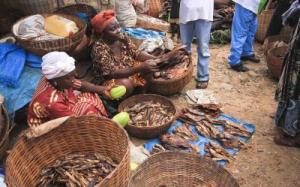
Women selling smoked fish in a market, Sierra Leone. Photo: Environmental Justice Foundation, http://ejfoundation.org/oceans/artisanal-fishing-industry-in-sierra-leone
In a recent publication in the journal Feminist Economics, “Fishing Na Everybody Business”: Women’s Work and Gender Relations in Sierra Leone’s Fisheries, Andy Thorpe and co-authors take three sets of data (from the National Frame Surveys of the Ministry of Fisheries and Marine Resources, a survey of women fish processors by the Institute of Marine Biology and Oceanography, and a World Bank survey of fishing communities) and perform a rich analysis of typically low-profile women in Sierra Leone fisheries.
Presently, Sierra Leone is one of the world’s most vulnerable countries, and one quite dependent on fish resources. The authors conclude:
“The livelihoods of women involved in the sector are complex, with fisheries-derived incomes not only being supplemented by alternative employment such as small-scale farming or running a small business, but also by household sharing (at least in part) of resources and incomes. A greater understanding of the (fisher) household economy is thus imperative to not only understand how women combine productive and reproductive tasks in Sierra Leone’s fishing communities, but also the extent to which women and men pool resources and income at the household level. Our study shows how although such women (in the main) lack education, access to resources, financial capital, and decision-making power, they nevertheless derive, in some instances quite substantive, incomes from fish processing.“
Contact for lead author Prof. Andy Thorpe: andy.thorpe@port.ac.uk
Abstract: While small-scale fisheries in many developing countries is “everybody’s business,” a gendered labor division concentrates production in the hands of fishermen while women dominate postharvest processing and retailing. The production bias of fisheries management programs has not only largely overlooked the role of fisherwomen, but also marginalized “fish mammies” in terms of resources and training. This study draws on three in-country fisheries surveys, as well as interviews and focus groups, and employs a gender-aware sustainable livelihood framework to make visible the economic space occupied by women in Sierra Leone’s small-scale fisheries. The study highlights how women’s variegated access to capital and resources interacts with social norms and reproductive work and argues for more social and economic investment in women’s fish processing and reproductive work enabling them to reconcile both roles more effectively.
This entry was posted in: Aquaculture, Freshwater Fisheries, Gender, Marine Fisheries, Men, Women
